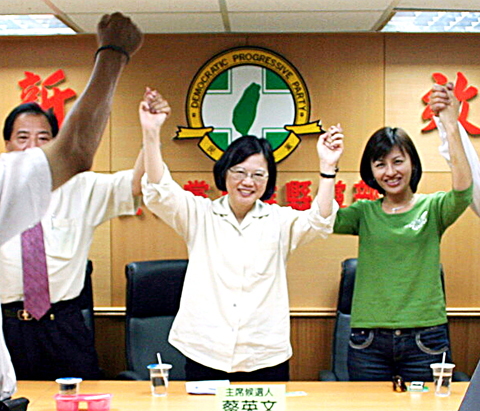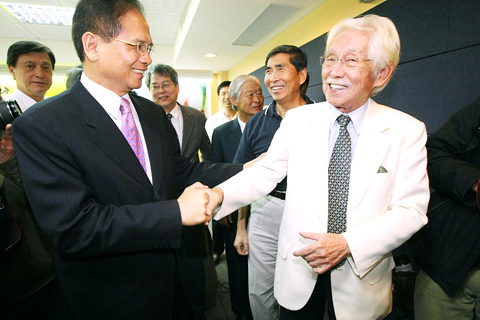The Democratic Progressive Party (DPP) chairmanship election became a two-way race between the young and the old as one of the conservative candidates yesterday withdrew to form an alliance with the 82-year-old former presidential adviser Koo Kwang-ming (辜寬敏).
Chai Trong-rong (蔡同榮) on Monday announced his withdrawal from the race and yesterday urged his supporters to back Koo in Sunday's election.
Describing Koo as his "close comrade-in-arms," Chai said he has known Koo for over 40 years and was deeply touched by Koo's devotion to the country when Koo vowed to dedicate the remainder of his life to the party and the country.

PHOTO: CNA
Chai said the party needs a leader who is resolute in his position of localization and establishment of a new republic to counter president-elect Ma Ying-jeou (馬英九 of the Chinese Nationalist Party (KMT).
"Tsai Ing-wen's (蔡英文) stance on localization is very vague, not to mention the stance of the [now disbanded] New Tide faction that supports her," Chai said. "Why do we need her since we have Ma Ying-jeou already?"
Chai singled out former New Tide heavyweights Hung Chi-chang (洪其昌), Wu Nai-jen (吳乃仁) and Chiou I-jen (邱義仁) for bringing trouble to the party.

PHOTO: CNA
He also criticized former DPP legislators Tuan Yi-kang (段宜康), Lee Wen-chung (李文忠) and Luo Wen-chia (羅文嘉)for harshly denouncing the party when the party was in trouble while keeping silent about the Papua New Guinea fund scandal.
If Tsai was to be elected, Chai said, those people would be recruited to the party and the party would become a place where there would be "no sense of right or wrong" and "no show of respect for the elders."
"I would really hate to see the party become a battlefield of factional infighting," he said. "A way to prevent it from happening is to support Koo so those people will not infiltrate the party headquarters."
Koo commended Chai's move as "taking the first step toward future inner-party reconciliation and unity."
One of the important missions of the new party chief, Koo said, is to return to power in 2012.
Former DPP chairman Yu Shyi-kun yesterday endorsed Koo's chairmanship bid and praised Chai's withdrawal, saying it would boost the odds of Koo's victory.
At a different setting, Tsai said the alliance between Koo and Chai may have some impact on her election but she is "cautiously optimistic" about her bid.
She dismissed Chai's allegation that she is vague in her localization position, saying that she is not any different from her contenders in this regard.
Commenting on Chai's criticism of factional support for her bid, Chai said the party will never be able to get back on its feet again if some indulge themselves in such "hackneyed ideas."
Pointing out that the DPP has grown from "a party of ideals" to "a party of realization," Tsai said the key to Sunday's election lies in the candidate who has the ability to put ideals into practice.
She said that during her stint as the head of the Mainland Affairs Council, she stabilized cross-strait relations and opened up cross-strait interactions but she never abandoned the nation's sovereignty.
Sunday's DPP chairmanship election is a choice between the past and the future, reminiscent of the struggles of the past and yet a courageous march forward. It represents the closing of one door and the opening of another door, she said.

An essay competition jointly organized by a local writing society and a publisher affiliated with the Chinese Communist Party (CCP) might have contravened the Act Governing Relations Between the People of the Taiwan Area and the Mainland Area (臺灣地區與大陸地區人民關係條例), the Mainland Affairs Council (MAC) said on Thursday. “In this case, the partner organization is clearly an agency under the CCP’s Fujian Provincial Committee,” MAC Deputy Minister and spokesperson Liang Wen-chieh (梁文傑) said at a news briefing in Taipei. “It also involves bringing Taiwanese students to China with all-expenses-paid arrangements to attend award ceremonies and camps,” Liang said. Those two “characteristics” are typically sufficient

A magnitude 5.9 earthquake that struck about 33km off the coast of Hualien City was the "main shock" in a series of quakes in the area, with aftershocks expected over the next three days, the Central Weather Administration (CWA) said yesterday. Prior to the magnitude 5.9 quake shaking most of Taiwan at 6:53pm yesterday, six other earthquakes stronger than a magnitude of 4, starting with a magnitude 5.5 quake at 6:09pm, occurred in the area. CWA Seismological Center Director Wu Chien-fu (吳健富) confirmed that the quakes were all part of the same series and that the magnitude 5.5 temblor was

The brilliant blue waters, thick foliage and bucolic atmosphere on this seemingly idyllic archipelago deep in the Pacific Ocean belie the key role it now plays in a titanic geopolitical struggle. Palau is again on the front line as China, and the US and its allies prepare their forces in an intensifying contest for control over the Asia-Pacific region. The democratic nation of just 17,000 people hosts US-controlled airstrips and soon-to-be-completed radar installations that the US military describes as “critical” to monitoring vast swathes of water and airspace. It is also a key piece of the second island chain, a string of

The Central Weather Administration has issued a heat alert for southeastern Taiwan, warning of temperatures as high as 36°C today, while alerting some coastal areas of strong winds later in the day. Kaohsiung’s Neimen District (內門) and Pingtung County’s Neipu Township (內埔) are under an orange heat alert, which warns of temperatures as high as 36°C for three consecutive days, the CWA said, citing southwest winds. The heat would also extend to Tainan’s Nansi (楠西) and Yujing (玉井) districts, as well as Pingtung’s Gaoshu (高樹), Yanpu (鹽埔) and Majia (瑪家) townships, it said, forecasting highs of up to 36°C in those areas